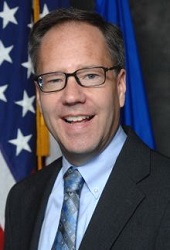 Jim Macrae, MA, MPP
Jim Macrae, MA, MPP
Acting Administrator
Health Resources and Services Administration
U.S. Department of Health and Human Services
www.hrsa.gov
Jim Macrae, MA, MPP became acting administrator for the U.S. Department of Health and Human Services’ Health Resources and Services Administration (HRSA) in April 2015. HRSA works to fill in the health care gaps for people who live outside the economic and medical mainstream. HRSA’s $10.3 billion annual budget (FY 2015) expands access to quality health care through an array of grants to state and local governments, health care providers and health professions training programs. Previously, as head of the Bureau of Primary Health Care (BPHC), Macrae managed a nearly $5 billion budget that supports the health care safety net for many underserved people across the country. Most of these funds support nearly 9,000 health center sites. Located in communities nationwide, these sites provide comprehensive, culturally competent, quality primary health care to nearly 22 million people. Macrae also oversaw the School-Based Health Center Capital Program that addresses significant and pressing capital needs in school-based health centers. These centers are a major component of the nation’s health care safety net and not only enable children with acute or chronic illnesses to attend school, but also improve their overall health and wellness through health screenings, health promotion, and disease prevention activities. Previously, Macrae served as associate administrator for HRSA’s Office of Performance Review (OPR) from 2000 to 2006, where he oversaw the work of staff in regional divisions across the country. OPR was previously the agency’s focal point for reviewing and improving the performance of HRSA-supported programs in states and communities. Prior to his years at OPR, Macrae served in several capacities at BPHC from 1992 to 2000. As the bureau’s director of the Office of State and National Partnerships, he worked with national and state associations across the country to increase access, reduce disparities in health outcomes, and improve the delivery of health services to underserved populations.



